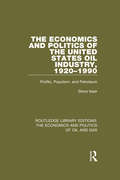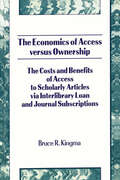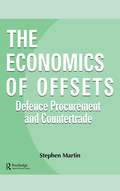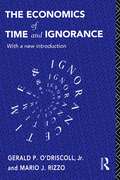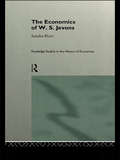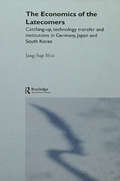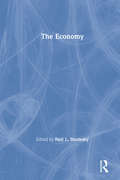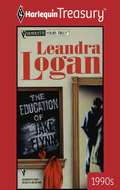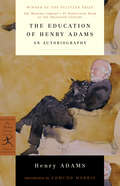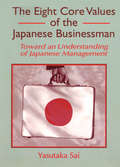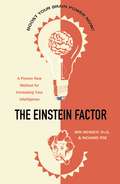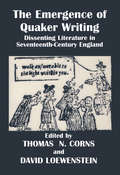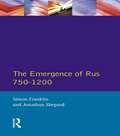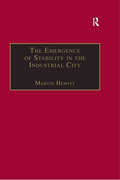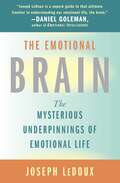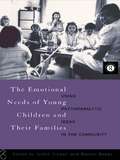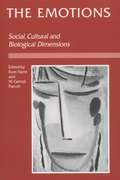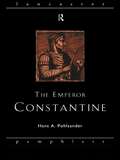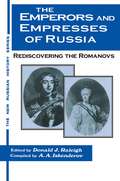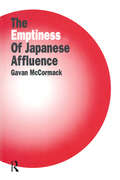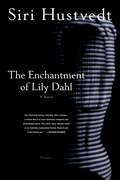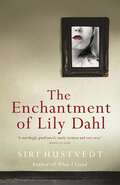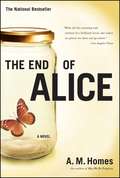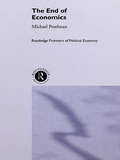- Table View
- List View
The Economics and Politics of the United States Oil Industry, 1920-1990: Profits, Populism and Petroleum (Routledge Library Editions: The Economics and Politics of Oil and Gas #8)
by Steve IsserThis book, originally published in 1996, traces the development of US government policy toward the oil industry during the 1920s and 1930s when the domestic syustem of production control was established. It then charts the deveopment and collapse of oil import controls, and the wild scramble for economic rents generated by Government regulation. It discusses the two oil crises and the ‘phantom’ Gulf War crisis, and the importance of public opinion in shaping the policy agenda. It also provides an in-depth study of Congressional oil votes from the 1950s to the 1980s and the formation of oil policy, beginning with theories of economic regulation, the role of interest groups in developing the policy agenda and the role of money in politics.
The Economics of Access Versus Ownership: The Costs and Benefits of Access to Scholarly Articles via Interlibrary Loan and Journal Subscriptio
by Bruce KingmaThe Economics of Access Versus Ownership offers library professionals a model economic analysis of providing access to journal articles through interlibrary loan as compared to library subscriptions to the journals. This model enables library directors to do an economic analysis of interlibrary loan and collection development in their own libraries and to then make cost-efficient decisions about the use of these services.This practical book’s analysis and conclusions are based on 1994/95 academic year research conducted by the State University of New York libraries at Albany, Binghamton, Buffalo, and Stony Brook. The research determined the costs and benefits of high-priced, low-use scholarly journals, focusing on journals in the mathematics and sciences that historically have high prices, low levels of use, and increasing rates of price escalation. The libraries’financial costs of access by interlibrary loan versus journal subscriptions was calculated and, using this information, a set of decision rules was established. Library directors and interlibrary loan/collection development heads can use this set of decision rules to determine, based on the level of use and subscription price, whether they should provide access to journal articles via interlibrary loan or journal subscriptions.The research findings presented in The Economics of Access Versus Ownership are significant to library professionals as journal subscription prices escalate and commercial document delivery services, consortium agreements, and interlibrary loan hardware and software proliferate. Contributors explore important factors necessary to understanding the economics of access. They encourage readers to consider the following when choosing between journal subscriptions and interlibrary loan: financial costs fixed and marginal costs decision rules which determine the most economically efficient method of access the use of a library consortium and joint collection development within the consortium as an economically efficient method of access added benefits of a library consortiumInformation found in The Economics of Access Versus Ownership makes it a useful guide for university and college library directors, interlibrary loan department heads, and collection development heads trying to choose the most economically sound, both for their libraries and their patrons, form of access to journal articles.
The Economics of Offsets: Defence Procurement and Coutertrade (Routledge Studies in Defence and Peace Economics #Vol. 4.)
by Stephen MartinDespite their growth, outlined and analysed in this book, the claims and counter-claims that surround offsets have not been subjected to critical scrutiny by economists. This book fills that gap. It brings together a team of internationally renowned specialists to document and evaluate the economic impact of several countries' offset policies. In addition, the papers by industrialists and defence officials yield further insights which help to tease out which of the claims made for offsets do not stand critical scrutiny.
The Economics of Time and Ignorance: With a New Introduction (Routledge Foundations of the Market Economy)
by Gerald P O'Driscoll Jnr Mario J RizzoThe Economics of Time and Ignorance is one of the seminal works in modern Austrian economics. Its treatment of historical time and of uncertainty helped set the agenda for the remarkable revival of work in the Austrian tradition which has led to an ever wider interest in the once heretical ideas of Austrian economics. It is here reprinted with a substantial new introductory essay, outlining the major developments in the area since its original publication a decade ago.
The Economics of W.S. Jevons (Routledge Studies in the History of Economics #No.9)
by Sandra PeartWilliam Stanley Jevons occupies a pivotal position in the history of economic thought, spanning the transition from classical to neo-classical economics and playing a key role in the Marginal Revolution. The breadth of Jevons's work is examined here which: * includes a detailed consideration of a wide range of his work-policy, theoretical, methodological, applied and empirical * relies on textual exegis * takes account of a wide range of secondary sources A new approach to the 'Jevonian revolution' is adopted, which emphasizes the link between poverty and economics and focuses on the nature and meaning of rationality in Jevonian economics.
The Economics of the Latecomers: Catching-Up, Technology Transfer and Institutions in Germany, Japan and South Korea (Routledge Studies in the Growth Economies of Asia #Vol. 6)
by Jang-Sup ShinThis book examines the spectacularly successful economies of East Asia, Japan and South Korea. The comparison of the 'catching-up' process in Japan and South Korea includes studies of the iron and steel and semi-conductor industries. The author shows the difficulties involved in trying to detect general patterns of development, as both countries appear to respond to different technological imperatives. As a result general models of development should be treated with caution, given the need to consider different historical and institutional contexts.
The Economy
by Neil Larry ShumskyVolume 4 "THE ECONOMY’ of the American Cities; series. This collection brings together more than 200 scholarly articles pertaining to the history and development of urban life in the United States during the past two centuries. The selections in Volume 4 of the series concern the development of the urban economy since the early nineteenth century. Three groups of articles, each arranged chronologically, deal with three basic sectors of the economy—trade and commerce (especially retailing), manufacturing and industrialization, and finance. Individual articles address subjects as diverse as merchants and shopping malls, flour milling and scientific management, and the Chicago Board of Trade and redlining.
The Education Of Jake Flynn
by Leandra LoganTEACH ME TONIGHT For Jake Flynn, the Jordan sisters were a dream come true: sexy, sassy Charmaine for…well, you know, and sensible, practical schoolteacher Nadine to help mother his daughter. His return to the tiny town of Cherry Creek, Georgia, was perfect—until his two presents for the two sisters got mixed up. And Nadine got the piece of sexy red lingerie. Suddenly Jake learned that there were a lot of things Nadine could teach him…
The Education of Henry Adams
by Henry Adams'I cannot remember when I was not fascinated by Henry Adams, ' said Gore Vidal. 'He was remarkably prescient about the coming horrors. ' His political ideals shaped by two presidential ancestors--great-grandfather John Adams and grandfather John Quincy Adams--Henry Adams was one of the most powerful and original minds to confront the American scene from the Civil War to the First World War. Printed privately in 1907 and published to wide acclaim shortly after the author's death in 1918, The Education of Henry Adams is a brilliant, idiosyncratic blend of autobiography and history that charts the great transformation in American life during the so-called Gilded Age. With an introduction by renowned historian Edmund Morris.
The Eight Core Values of the Japanese Businessman: Toward an Understanding of Japanese Management
by Erdener Kaynak Yasutaka SaiThe values and behaviors of the Japanese businessman--and of the Japanese in general--are quite diverse and keep changing, making it difficult for anyone (including the Japanese themselves) to truly understand why they act the way they do. The Eight Core Values of the Japanese Businessman saves readers time and effort when pursuing business opportunities in Japan because it identifies the core values of the Japanese businessman, ranging from the obvious and public, “Diligence,” to the more private, “Silence as Eloquence” and “Perception of Time.” After identifying these eight core values, Yasutaka Sai explores the history and modern interpretation of each. Based on over 300 Japanese language sources--otherwise unavailable to those who do not read Japanese--The Eight Core Values of the Japanese Businessman reveals the diversity and dynamism of Japanese values and behaviors. This information empowers businesspeople and international business educators to develop solid business relationships with the Japanese. With many years of experience, the author focuses on specific values that are most common among Japanese in the business world. These are not exclusive, but the most prevalent or widely shared values that Western businesspeople are likely to encounter:Japanese diligence, work ethic, and “Gambarism” or persistencegroup orientation: sense of belonging and participation, spirit of harmony, interpersonal relationsaesthetics and perfectionismcuriosity and emphasis on innovationrespect for form and “Hana Yori Dango” or practicalitya mind for competition and outlook on rewardsthe value of silence as eloquenceperception of timeAs there is no single uniformly accepted source for the values of today's Japanese citizen or business person, Sai's exploration opens a vital window into understanding many Japanese values and behaviors. The Eight Core Values of the Japanese Businessman is vital reading for those with international business concerns--business and management educators, businesspeople interested in how Japanese managers manage and employees work, and practicing managers interested in cross-cultural management issues. It allows readers to develop good relationships with the Japanese based on a realistic understanding of how they think and act, both individually and as members of business organizations.
The Einstein Factor: A Proven New Method for Increasing Your Intelligence
by Richard Poe Win Wenger"The Einstein Factor liberates mental abilities you didn’t know you had. I tried the techniques in the book and they paid off instantly. It’s almost scary."—Duncan Maxwell Anderson, senior editor, Success.New research suggests that the superior achievements of famous thinkers may have been more the result of mental conditioning than genetic superiority. Now you can learn to condition your mind in the same way and improve your performance in virtually all aspects of mental ability, including memory, quickness, IQ, and learning capacity. Intelligence pioneer Dr. Win Wenger has identified the tools you need to reach greater levels of sharpness, insight, and overall intelligence. Using Wenger’s Image Streaming technique, you learn to bypass inhibitions and access the hypernormal capabilities hidden in your own subconscious. Discover how you can: ·Improve your memory ·Read faster and learn more quickly ·Solve problems like a genius ·Score higher on tests ·Build self-esteem ·Induce a state of total creative absorption ·Access powerful subconscious insights through visualization ·Increase your intelligence The Einstein Factor is your key to living an extraordinarily effective and creative life!
The Emergence of Quaker Writing: Dissenting Literature in Seventeenth-Century England
by Thomas N. Corns David LoewensteinAmong the radical sects which flourished during the tumultuous years of the English Revolution, the early Quakers were particularly aware of the power of the written word to promote their prophetic visions?and unorthodox beliefs.This collection of new essays by literary scholars and historians looks at the diversity of seventeenth-century Quaker writing, examining its rhetoric, its polemical strategies, its purposeful use of the print medium, and the heroism and vehemence of its world vision.
The Emergence of Russia 750-1200 (Longman History of Russia)
by Jonathan Shepard Simon FranklinThis eagerly awaited volume, the first of its kind by western scholars, describes the development amongst the diverse inhabitants of the immense landmass between the Carpathians and Urals of a political, economic and social nexus (underpinned by a common culture and, eventually, a common faith), out of which would emerge the future Russia, Ukraine and Belarus. The authors explore every aspect of life in Rus, using evidence and the fruits of post-Soviet historiography. They describe the rise of a polity centred on Kiev, the coming of Christianity, and the increasing prosperity of the region even as, with the proliferation of new dynastic centres, the balance of power shifted northwards and westwards. Fractured, violent and transitory though it often is, this is a story of growth and achievement - and a masterly piece of historical synthesis.
The Emergence of Stability in the Industrial City: Manchester, 1832–67
by Martin HewittThe rapid eclipse of Chartism, and the relative tranquility of the period 1848-67 has been one of the most enduring puzzles of nineteenth-century British history. This book takes a fresh look at this conundrum, treating the period between the Reform Acts of 1832 and 1867 as a coherent whole for the first time. It suggests that previous depictions of 1848 as a watershed in British history have both exaggerated the nature of the transitions which occurred at mid-century, and have over-estimated both the collapse of radical attitudes and the fading of working-class resentment. The experiences of the Manchester working class show that poverty, unemployment and hardship persisted through the mid-Victorian boom. While some workers may have taken advantage of economic opportunities and the various movements of social and moral reform promoted by the middle class to acquire respectability, in general, attempts at middle-class ’moral imperialism’ brought only marginal changes to popular culture and attitudes. Instead, it is argued, the roots of the radical collapse and of political stability lie elsewhere: in the initial failure of radical leaders to sustain a firm consensus on effective strategies of reform, and in changes in the political culture of the mid-century city which closed off spaces in which independent working-class politics could continue to function. In the context of the most important industrial city of the era, this study provides a wide-ranging analysis of the complex forces which forged the uneasy compromise on which mid-nineteenth century stability rested.
The Emotional Brain: The Mysterious Underpinnings of Emotional Life
by Joseph LedouxWhat happens in our brains to make us feel fear, love, hate, anger, joy? Do we control our emotions, or do they control us? Do animals have emotions? How can traumatic experiences in early childhood influence adult behavior, even though we have no conscious memory of them? In The Emotional Brain, Joseph LeDoux investigates the origins of human emotions and explains that many exist as part of complex neural systems that evolved to enable us to survive. One of the principal researchers profiled in Daniel Goleman's Emotional Intelligence, LeDoux is a leading authority in the field of neural science. In this provocative book, he explores the brain mechanisms underlying our emotions -- mechanisms that are only now being revealed.
The Emotional Needs of Young Children and Their Families: Using Psychoanalytic Ideas in the Community
by Judith Trowell Marion BowerThe aim of this book is to provide illustrations of ways in which psychoanalytic ideas can be adapted and used in a wide variety of community settings - including social services, schools and hospitals - to help children and families who are emotionally disturbed or who have been physically or sexually abused. It is a book for professionals who are interested in using psychoanalytic ideas in their own work settings, and assumes no previous knowledge of these ideas on the part of the reader. It provides basic principles, many practical examples, further reading, and information about where to get support and consultation.
The Emotions: Social, Cultural and Biological Dimensions (The\law And Public Policy Ser.)
by Professor Rom Harre W Gerrod ParrottThis fascinating book overviews the psychology of the emotions in its broadest sense, tracing historical, social, cultural and biological themes and analyses. The contributors - some of the leading figures in the field - produce a new theoretical synthesis by drawing together these strands. <p><p> From the standpoint of the function of the emotions in everyday life, the authors focus on: the discursive role played by the emotions in expressing judgements about, attitudes to and contrition for actions done by the self and others, and how certain emotions - such as guilt, shame, embarrassment, chagrin and regret - seem to play a role in social control; the variation and diversity in emotion, which provides scope for exploring how patterns of emotion contrast in different societies, across gender lines, at different historical times, and between children and adults; and the way in which the body is shaped and its functions influenced by culturally maintained patterns of emotion displays.
The Emperor Constantine
by Hans A. PohlsanderConstantine is a convenient and concise account of one of the most important figures in ancient history. Hans Pohlsander:* describes the Roman world into which Constantine was born* assesses Constantine's ability as soldier and statesman* emphasizes the significance of Constantine as Rome's first Christian emperor* discusses the importance of the establishment of the new capital at Byzantium* gives an even-handed assessment of Constantine's achievement* incorporates a cultural and artistic focus, analyzing coins, architecture, sculpture and painting of the period.
The Emperors and Empresses of Russia: Reconsidering the Romanovs (The\new Russian History Ser.)
by Donald J. Raleigh A.A. IskenderovSince glasnost began, Russia's most eminent historians have taken advantage of new archival access and the end of censorship and conformity to reassess and reinterpret their history. Through this process they are linking up with Russia's great historiographic tradition while producing work that is fresh and modern. In "The Emperors and Empresses of Russia", renowned Russian historians tell the story of the Romanovs as complex individual personalities and as key institutional actors in Russian history, from the empire builder Peter I to the last tsar, Nicholas II. These portraits are contributions to the writing of history, partaking neither of wooden ideologisation nor of naive romanticisation.
The Emptiness of Affluence in Japan (Japan In The Modern World Ser.)
by Gavan McCormackAgainst the powerful image of Japan as a rising economic superpower, or even, in Ezra Vogel's influential formulation a deade ago, "Japan as number 1", this book explores the fragility, hubris and human and environmental costs of Japan's desperate drive for hyperdevelopment. As this economic superpower finds itself drifting, rudderless, through the decade, four seminal events seem to emblemise the enveloping crisis: the Kobe Earthquake, which the author shows to be no mere act of nature, but an event whose consequences are intimately bound up with desperate hypergrowth; The Ayum Rikyo poison gas attack, which struck at Japan's sense of security in its deepest senses (psychological and moral, as well as physical); the collapse of the LDP single-party rule after nearly 40 years, plunging Japan's superstable political system into crises manifested by implausible coalition with little more than a thirst to rule in common; and Japan's inability to come to terms with war respnsibility ever after 50 years, best symbolised by the Comfort Women issue and the government's hapless attempt to come up with an appropriate formula for recognising, apologising and making amends for wartime aggression and crimes. Gavan McCormack addresses these issues - which are political, economic, social cultural and moral in the most profound sense - directly in this book.
The Enchantment of Lily Dahl: A Novel
by Siri HustvedtLily Dahl, the young heroine of Siri Hustvedt's riveting novel, The Enchantment of Lily Dahl, is a strong, beautiful and daring nineteen year old girl poised on the brink of womanhood. In the small town of Webster, Minnesota, Lily's life revolves around the Ideal Café. She lives above the café in a rented room and works there as a waitress. This is the stage Hustvedt sets for a bizarre cast of characters who frequent the café and populate Lily's life.Weaving a fascinating spell of mystery and suspense, Hustvedt recounts the erotic adventures, unexpected friendships, and inexplicable acts of madness that usher Lily into womanhood. By skillfully mixing reality and dreams, fact and fiction, past and present, Hustvedt creates a powerful world not quite real, but altogether truthful.
The Enchantment of Lily Dahl: Longlisted for the Women's Prize for Fiction
by Siri HustvedtLily Dahl is a heroine of the old school: tough, beautiful and brave. A nineteen-year-old waitress and aspiring actress living in Webster, Minnesota, she becomes enchanted by an exotic outsider - an artist from New York. Drawn into a world of erotic adventure, she finds herself the target of mysterious acts of madness as she strains against the confines of small town life.
The End Of Alice
by A.M. HomesFrom the 2013 Orange Prize–winning author of May We Be Forgiven.Only a work of such searing, meticulously controlled brilliance could provoke such a wide range of visceral responses. Here is the incredible story of an imprisoned pedophile who is drawn into an erotically charged correspondence with a nineteen-year-old suburban coed. As the two reveal—and revel in—their obsessive desires, Homes creates in The End of Alice a novel that is part romance, part horror story, at once unnerving and seductive.
The End Of Capitalism (As We Knew It): A Feminist Critique of Political Economy
by J.K. Gibson-GrahamIn the mid-1990s, at the height of academic discussion about the inevitability of capitalist globalization, J. K. Gibson-Graham presented a groundbreaking and controversial argument for envisioning alternative economies. This new edition includes an introduction in which the authors address critical responses to The End of Capitalism and outline the economic research and activism they have been engaged in since the book was first published. &“Paralyzing problems are banished by this dazzlingly lucid, creative, and practical rethinking of class and economic transformation.&” —Meaghan Morris, Lingnan University, Hong Kong &“Profoundly imaginative.&” —Eve Kosofsky Sedgwick, City University of New York &“Filled with insights, it is clearly written and well supported with good examples of actual, deconstructive practices.&” —International Journal of Urban and Regional Research J. K. Gibson-Graham is the pen name of Katherine Gibson and Julie Graham, feminist economic geographers who work, respectively, at the Australian National University in Canberra and the University of Massachusetts Amherst.
The End of Economics (Routledge Frontiers Of Political Economy Ser. #Vol. 4)
by Michael PerelmanMost economic theory assumes a pure capitalism of perfect competition. Even when it is recognized that this does not exist, many politicians and captains of industry pay a great deal of lip service to the idea of the market. This book goes beyond the rhetoric to explore how, even in the United States, the most capitalist of all countries, the marke
